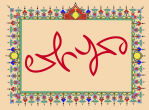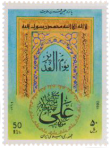
His Highness the Aga Khan seen giving his commencement lecture at the American University in Cairo on June 15, 2006. The excerpt on Hazrat Ali, from whom the 49th Ismaili Imam is directly descended, is from the address. Photo Credit: American University in Cairo.
Editor’s note: According to tradition Hazrat Ali (A.S.) was born on the 13th day of the Islamic month of Rajab, approximately twenty one years before the Hegira or the migration of the Prophet Muhammad (SAWS) from Mecca to Medina, from which the Muslim calendar begins. For 2011, the 13th of Rajab falls on Tuesday, June 14. The various sayings of Hazrat Ali are produced from Nahj-ul-Balagha and are not part of the original article.
By Lt. Col ‘Abdullah Baines-Hewitt
The Imam ‘Ali (A.S.) is a unique figure in the history of Islam, a personality the vital freshness of whose memory has not been dimmed by the passage of time. A man of great integrity, in whose character great personal bravery was balanced by tenderness of feeling and an exemplary humanity, who combined patience and forbearance with a strong sense of justice, who was already ready to play his part in the struggle for the realization of the truth and ideals of religion, and whose outstanding intellectual gifts were ennobled by a singular purity of spirit; this was Amir al-Mu‘minin (Commander of the Faithful) ‘Ali, who also earned for himself the appellation Imam al-Muttaqin (Leader of the Godfearing). To millions and millions, for generation after generation, the Imam ‘Ali has been a name to conjure with. It has never failed to bring profound solace to the heart and upliftment to the soul. ‘Ali was the magnanimous humanist who advised people to “live in such a good, gentle and noble way that folk will love to flock to you when you are alive and will weep for you when you are dead”. And how well he put this precept into practice in his own life is attested by all those generations of human beings who have found inspiration in his example and teaching.
In defence of the faith and the Holy Prophet
 “These companions of the Holy Prophet, who acted as the first line of defence for the Prophet and Islam, know and can testify that I never, even for a second, violated the orders of God and the Holy PropheL On all such occasions when even the bravest of men felt nervous and wanted to get out of the engagement I risked my life to save the life of the Holy Prophet and to defend the cause of Islam.
“These companions of the Holy Prophet, who acted as the first line of defence for the Prophet and Islam, know and can testify that I never, even for a second, violated the orders of God and the Holy PropheL On all such occasions when even the bravest of men felt nervous and wanted to get out of the engagement I risked my life to save the life of the Holy Prophet and to defend the cause of Islam.
When the Holy Prophet died, he breathed his last with his head resting on my breast. I was embracing him. I felt his last breath on my hands and as a token of my love and respect for him I spread those hands of mine on my face. 1 bathed his body and none but angels were helping me in those ablutions.
During his lifetime I was dearest and nearest to him and at his death I was the last to part with him.
Who can claim to have closer connection with him than I and who can assert to have greater right to be his heir and successor?”….Khutba 202
Islam was not established without a struggle, and whoever has heard the name of ‘Ali has, of course, known of his valour as a warrior for Islam. Not only did he figure prominently in nearly all the early battles of Islam, but his qualities as a fighter were of an almost legendary order. In those campaigns which the Muslims had to undertake against their Meccan foes, in which the infant Muslim community was struggling for its very existence against heavy odds, their victory – the triumph of truth over falsehood – was due to the indomitable will of the Prophet Muhammad, and ‘Ali was among the ablest of his lieutenants. On more than one occasion ‘Ali’s bravery and skill saved the Muslims from defeat.
Allah
 Praise be to Allah, when the night falls and darkens, and praise be to Allah when the stars shine and set…Khutba 48
Praise be to Allah, when the night falls and darkens, and praise be to Allah when the stars shine and set…Khutba 48
Every thing submits to Allah, and everything exists by Him. He is the recourse of every poor, the honour of the lowly, the might of the weak, and the comfort of the grieved. Allah hears the speech of every speaker, and knows the secret thoughts of one who keeps silent. He provides the livelihood of every living thing, and to Him returns everything that dies…Khutba 109
Ali’s remarkable physical strength was fully matched by his skill as a fighter and his capacity for rallying others and leading them in the fight. Thus, at the Battle of Uhud (624 C.E.) it was through the instrumentality of ‘Ali that Islam was saved from what might have turned out to be its early end. The tide of battle was going against the Muslims owing to their own over-eagerness. Suddenly it was rumoured that the Prophet had been killed, and fear and terror entered the hearts of the Muslim warriors, but ‘Ali and those who were with him fought valiantly on. From a point of vantage, and led by ‘Ali, they rushed into the midst of the host of the idolaters, rescuing the Prophet, who had indeed been wounded, and retiring with him to the comparative safety of the mountain-side. There ‘Ali fetched water from a hollow in the rock and bathed Muhammad’s wounds. And the Quraysh, by then exhausted, broke off the engagement and returned to Mecca.
Ahl-e-Bait (I)
 “Remember that we are the Ahl-e-Bait (the progeny) of the Holy Prophet. We are his true companions, we are trustees and treasurers of the knowledge granted to him and we are the doors through which one can reach this store house of wisdom and learning. It is unlawful to enter a house but through its door, and he who disregards this principle is a trespasser or a thief.
“Remember that we are the Ahl-e-Bait (the progeny) of the Holy Prophet. We are his true companions, we are trustees and treasurers of the knowledge granted to him and we are the doors through which one can reach this store house of wisdom and learning. It is unlawful to enter a house but through its door, and he who disregards this principle is a trespasser or a thief.
“They (Ahl-e-Bait) own and possess in their deeds and words the excellence and nobleness which the Holy Qur’an preaches. They are the treasure houses of Mercy and Benevolence of God and they are the sources from which real wisdom and true knowledge, destined by Him for man, could be obtained.
“Their speeches contain nothing but truth. If they do not speak about any subject it is not because they do not know anything about it or anyone else could speak better, but simply because it is best not to speak then.” …Khutba 157
At the Battle of Khaybar (628 C.E.) it was ‘Ali’s skill and courage, as well as his immense powers of endurance, that carried the day and won victory for the Muslims and for ‘Ali the proud title of Asad Allah (the Lion of God). Again, after the conquest of Mecca, it was ‘Ali who saved the day at Hunayn (630 C.E.), when the Muslims’ ranks were wavering under the arrows of the Hawazin marksmen, and all might have been lost had he not rallied the few faithful warriors who stood firm in the Prophet Muhammad’s defence. Ordering the manner of their resistance, and setting them a bold example by killing the commander of the hostile army in hand-to-hand combat, ‘Ali so steadied their nerve that they fought back vehemently and broke the enemy’s onslaught. The rest of the Muslims, encouraged by what they now saw, re-entered the battle; and thus was the danger of defeat turned into a brilliant victory.
Ahl-e-Bait (II)
 “We (Aal-e-Muhammad) guided you from the obscurity of ignorance and infidelity towards the splendours of knowledge and religion; we raised the standards of your life and culture for you. Because of us you saw the lights of truth and wisdom and came out of the darkness of heathenism and depravity.
“We (Aal-e-Muhammad) guided you from the obscurity of ignorance and infidelity towards the splendours of knowledge and religion; we raised the standards of your life and culture for you. Because of us you saw the lights of truth and wisdom and came out of the darkness of heathenism and depravity.
“May God grant strength, boldness and stability to persons who are afraid of nothing but His Might.
“Remember, he who forsakes me and does not obey me is in the wrong. I never doubted the obligations laid upon me and the rights and privileges due to me from the time they were revealed to me.”…Khutba 8
But ‘Ali was more than a mere warrior, more than just a mighty man at arms, for he understood the real nature of jihad — the struggle (for the realization of the truth and ideals of religion). This is an all-encompassing struggle a struggle against those who are bent on destroying the faith, and at the same time a struggle against the disruptive impulses in human nature which militate against the vital teachings of religion and are repugnant to its ideals. It is as much a battle against an internal as against an external foe. At Khaybar, when no result of the battle was yet in sight, this is what the Prophet Muhammad had to say: “Tomorrow I will give my banner to one who loves God and His Prophet and whom God and His Prophet love. He is indeed a valiant fighter and no run-away. And God will conquer by his means”. It was ‘Ali to whom the flag was entrusted on the following day, and it was under his leadership that they conquered, and to whom the last of the forts fell. The Prophet’s mention of “one who loves God and His Prophet and whom God and His Prophet love” is a reference to those higher values which distinguish the greater jihad and to which he wanted to draw attention. Therefore, he refers to the love of God and of the Prophet before making mention of any martial ardour or fighting qualities.
The Tradition of Hazrat Ali Today
 This is a time of new freedoms, but it is also one in which new choices must be made wisely. In exercising freedom and making choices, our institutions must be guided, as they have been in the past, by the teachings of the Prophet Muhammad (Peace of Allah be upon him), and the tradition of our tariqah, which is the tradition of Hazrat Ali: A thinking Islam and a spiritual Islam – an Islam that teaches compassion, tolerance and the dignity of man – Allah’s noblest creation.”…An excerpt from His Highness the Aga Khan’s message dated May 14, 1992, sent on the occasion of the 25th anniversary celebration of the Aga Khan Foundation.
This is a time of new freedoms, but it is also one in which new choices must be made wisely. In exercising freedom and making choices, our institutions must be guided, as they have been in the past, by the teachings of the Prophet Muhammad (Peace of Allah be upon him), and the tradition of our tariqah, which is the tradition of Hazrat Ali: A thinking Islam and a spiritual Islam – an Islam that teaches compassion, tolerance and the dignity of man – Allah’s noblest creation.”…An excerpt from His Highness the Aga Khan’s message dated May 14, 1992, sent on the occasion of the 25th anniversary celebration of the Aga Khan Foundation.
A true mujahid (striver for Islam) must live his life for the cause of Islam, and give his life for it. He must fight, and also, when necessary, refuse to fight. He must forbear and forgive. He must turn always to God, to serve Him and praise Him — in prayer and act. He must toil ceaselessly fi Sabil Allah —“in the way of God” — enjoining good and forbidding evil, and he must observe the limits set by God. This is what the Imam ‘Ali did, and his whole life from beginning to end was a continuous jihad.
Date article posted: June 11, 2011
~~~~~~~~~~~~~
Editor’s note: The above article, excluding the quotes of Hazart Ali and His Highness the Aga Khan, has been reproduced from Ilm magazine, Volume 2, Number 1 (July, 1976). It is an edited version of a paper delivered by ‘Abdullah Baines-Hewitt at the Shi’ah Islamic Society, London, on the occasion of the birthday of Hazrat ‘Ali. The author once held the position as the President of the Shi’ah Society.
Please click http://www.akdn.org/Content/182 to read complete speech made by His Highness the Aga Khan at the American University in Cairo. The AKDN Website contains over 125 speeches made between 1994-2011 by His Highness, members of his family and other eminent government and civic leaders.
Other readings related to Hazrat Ali on this Website:
The Wisdom of Hazrat Ali: Selections from Nahj al-Balaghah for Young People (I)
Surrender and Realisation: Imam Ali on the Conditions for True Religious Understanding
The Tradition of Hazrat Ali: A Thinking Islam and a Spiritual Islam
The Love for Ali
Hazrat Ali’s Example: What We Can Do Today
A Christian Envoy at the Ghadir Khumm Campsite
Ghadir-Khumm and the Two Weighty Matters
Discourses of Hazrat Ali
Literary Reading: Ethics in Kalam-i Mawla of Hazrat Ali, Part One (in multiple parts)
Literary Reading: Enduring Teachings of Hazrat Ali
♦ Literary Reading: The Historical Roots of Imamat
Literary Reading: Nasir-i-Khushraw on The Excellence of ‘Ali
We welcome feedback/letters from our readers. Please use the LEAVE A REPLY box which appears below. Your feedback may be edited for length and brevity, and is subject to moderation. We are unable to acknowledge unpublished letters.
Please visit the Simerg Home page for links to articles posted most recently. For links to articles posted on this Web site since its launch in March 2009, please click What’s New.
Sign-up for blog subscription at top right of this page.

Divinal. a humanidade deve ler a menssagem de Hazrat Ali
After I read this article, I realise how little did I know about Imam Ali. Excellent well written. Thanks for sharing. A must reading for the REC students.
Mansur
For my Mawla Ali, I will serve him till my last breath.